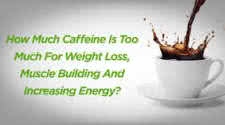Effects of Caffeine & Bodybuilding: Caffeine for Muscle Gain or Loss?

Drinking Coffee Before your Workouts.. read on!
For centuries throughout the world, coffee has been used for its ability to stimulate the central nervous system. But
bodybuilders have only recently begun taking advantage of this very potent ergogenic aid. Naturally available in more
than 63 species of plants, it's become extremely popular with bodybuilders as a preworkout pick-me-up. Many elite
bodybuilders are often spotted slugging down a strong cup of Joe before a workout.
No wonder. Coffee is one of the most abundant sources of caffeine, with one eight-ounce cup containing as much as 140
milligrams. Caffeine can give you a boost and possibly help in maintaining your intensity during a heavy workout.
Caffeine, or trimethylxanthine, was first isolated from green coffee beans in 1820 by a German scientist named Ferdinand
Runge. At room temperature, caffeine is a white odorless powder with a very bitter taste (trust me - you don't want to
try it for yourself). Following oral ingestion, caffeine is rapidly and completely absorbed from the gastrointestinal
tract into the bloodstream. Once in general circulation, it's readily distributed throughout the entire body and is quickly
assimilated, reaching peak blood levels within 60 minutes of ingestion. To bodybuilders, timing is critical when using
caffeine for performance-enhancing purposes. Smart athletes take it 45 minutes prior to training.
In recent human as well as animal research studies, there have been results showing that there are really not any significant
physiological barriers that are directly limiting clear passage of caffeine elements through any cells. Therefore, we can
therefore suggest that caffeine uniquely possesses the reasonably ability to affect a large range of organ systems as well
as body tissues, including lean muscle tissue.
Muscle tissue is highly sensitive to caffeine. At the cellular level, the major player causing muscle contraction is calcium.
Caffeine acts directly on the storage site for calcium in skeletal muscle, an area known as the sarcoplasmic reticulum (SR).
When caffeine interacts with the SR. increased amounts of calcium are dumped into the muscle, thus causing stronger muscle
contractions. These effects occur deep within muscle cells and are not something you can feel, but the end product of the
caffeine/calcium interaction can be evident by your ability to handle increased workout poundages.
The results of laboratory studies on caffeine and exercise have been mixed regarding the ergogenic effects of the substance.
Most of the research has revolved around cyclists, not resistance-trained athletes. Though scientific evidence points toward
a negligible effect of caffeine on power and force output, one can't ignore the thousands of bodybuilders and strength
athletes who swear that their training sessions are more intense due to the stimulatory effects of this drug.
Also, caffeine affects bodyfat and muscle metabolism. Caffeine can increase the levels of cyclic adenosine monophosphate (cAMP),
which results in increased blood sugar and increased lipolysis (liberation of free fatty acids from fat cells), The latter gives
rise to increased energy and work output during long-term sessions of exercise, such as an extended cardio workout.
Changes in a muscle's metabolism of energy substrates could also have a profound effect on fat loss. By increasing the release
of free fatty acids along with cutting your carbs while dieting, you're going to lose serious amounts of bodyfat. This finding
has important implications for precontest bodybuilders and others wanting to get lean.
Used prudently, caffeine is one of the most effective and safe ergogenic aids ever discovered, and it's legal. It can increase
the intensity of your workouts and enhance fat loss during dieting. Remember, caffeine is a drug and can have serious side
effects (see sidebar). But tell your friend he's wrong: Caffeine cannot hinder your muscle growth. In fact, it might help you
get stronger and leaner.